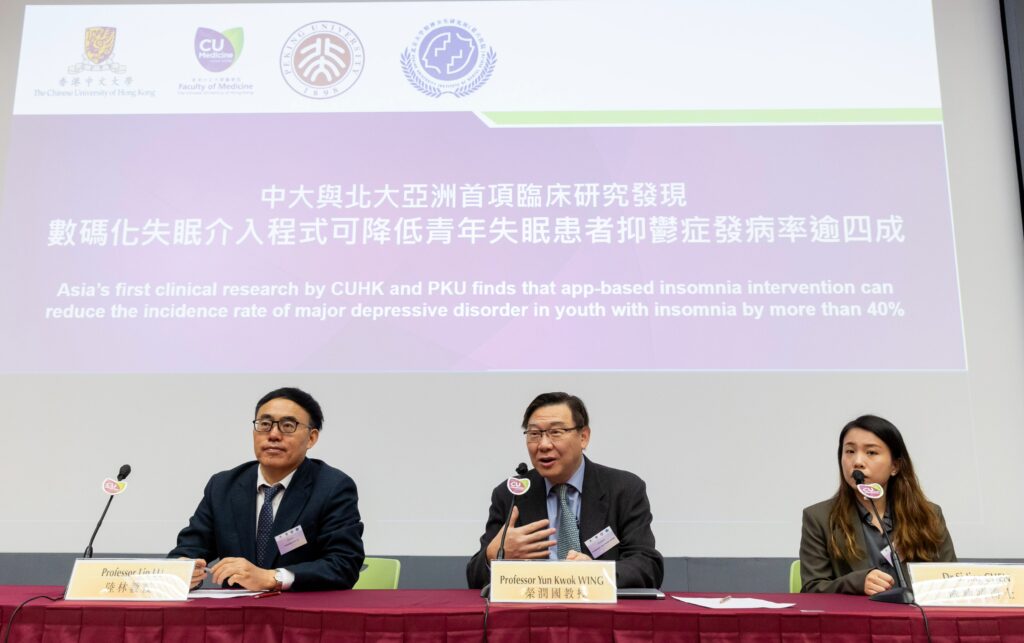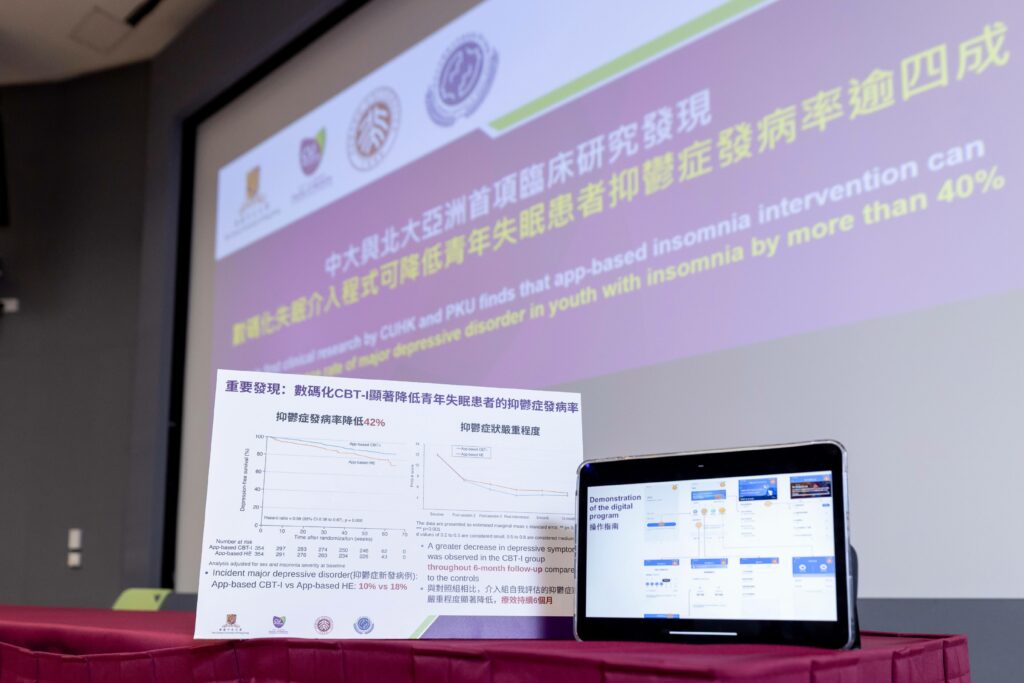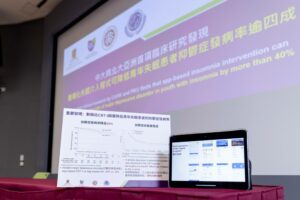CUHK
News Centre
Asia’s first clinical research by CUHK and PKU finds that app-based insomnia intervention can reduce the incidence rate of major depressive disorder in youth with insomnia by more than 40%
The Chinese University of Hong Kong (CUHK)’s Faculty of Medicine (CU Medicine) and Peking University (PKU) Sixth Hospital jointly conducted Asia’s first clinical research into digital cognitive behavioural therapy for insomnia (the “Digital CBT-I intervention App”), which has been found to significantly improve insomnia and depressive symptoms in youth and reduce their future risk of developing depression by more than 40%, with sustained efficacy and favourable response. This breakthrough is set to offer a novel treatment which is effective and easy to popularise and promote as a means of self-help among youth in China, Asia and the rest of the world, opening a new horizon for youth digital mental health development. The research has been published in the leading international medical journal PLoS Medicine.
Major depressive disorder (depression) is one of the most common mental disorders, affecting 1.2 billion youth[1] worldwide. A lack of medical resources and a low rate of seeking help weigh heavily on doctors, patients and their families. Though the medical field has discovered a close causal relationship between insomnia and depression, and identified insomnia as an independent risk factor for depression, there is a lack of clinical evidence about preventing youth depression via insomnia intervention, especially using digital means, further limiting the options available to doctors and patients.
The causal relationship between insomnia and depression lacks clinical evidence
Insomnia is a predisposing factor and a common symptom of depression. In addition to a persistent depressed mood, patients with depression often experience recurring insomnia symptoms, which not only affects their wellbeing and social functioning but can also trigger suicidal thoughts.
At a transitional stage of growth, youth are particularly susceptible to mental illness. Studies show that three-quarters of mental illness cases emerge before the age of 24. According to the WHO[2], depression is estimated to occur among 3.5% of youth aged 15-19 globally. In mainland China, about 2% suffer from depression[3], while the issue affects 3.9%-5.2% in Hong Kong[4]. Addressing insomnia in youth is likely to reduce their risks of depression.
Professor Lu Lin, Academician of the Chinese Academy of Sciences and President of PKU Sixth Hospital, said: “CBT-I is an effective first-line treatment for chronic insomnia. However, no research has been conducted in Asia on the effectiveness of this therapy in preventing youth depression when delivered in a digital format as an alternative to face-to-face treatments. A community-based study indicates that the help-seeking rate of young insomnia patients from mainland China and Hong Kong is as low as 10%. This underscores the low acceptance of traditional treatments among high-risk youth, which may lead to an increased risk of depression.”
Digital CBT-I intervention App reduces likelihood of major depression by over 40%
This study included 708 participants (aged 15-25) with insomnia disorder and subclinical depressive symptoms[5] from mainland China and Hong Kong, 57% of whom were female. Participants were randomly allocated to either the intervention group or the control group at a 1:1 ratio. The former undertook treatment via the Digital CBT-I intervention App on their phones for six weeks and the latter received app-based health education[6]. Both groups underwent multiple clinical assessments and self-evaluations[7], including follow-ups at six and 12 months.
Digital CBT-I was found to be effective in improving insomnia and depression at both symptom and disorder levels. It also led to significant reductions in daytime fatigue and a greater shift towards so-called morningness. In particular, the intervention group had a remission rate for insomnia disorder of nearly 60% at one-year follow-up. The intervention group demonstrated a 42% lower incidence rate of depression compared to the control group (10% vs. 18%), while 90% of participants attended at least one assessment and 84% of those in the intervention group completed all treatment sessions. No adverse events[8] related to the interventions were reported.
Dr Chen Si-jing, the first author of the research and a postdoctoral fellow from Department of Psychiatry, CU Medicine, said: “The study demonstrates that digital CBT-I is effective in preventing future onset of major depression with satisfactory efficacy. The high completion rate reflects how a fully automated treatment motivates young patients to understand their sleep, physical and psychological wellbeing, allowing them to address their mental distress proactively. The findings reveal that a digital self-help treatment without face-to-face interaction is more readily accepted by the digital-native generation. This represents a breakthrough in the treatment of youth mental illness.”
Professor Wing Yun-kwok, Choh-Ming Li Professor of Psychiatry, Chairman of Department of Psychiatry at CU Medicine and Director of the Li Chiu Kong Family Sleep Assessment Unit, remarked: “These findings highlight the importance of developing digital mental health therapeutics to meet the significant clinical demand, the pivotal role of prevention and early intervention in ameliorating the burden of youth depression and the need for evidence-based digital mental health intervention. Future studies should explore how to integrate digital insomnia intervention into clinical practice, especially in primary care, and examine how to adapt this novel treatment to advance the field towards personalised prevention and early intervention in the community.”
[1] Young people are defined as those between the ages of 15 and 24, according to the United Nations in 2024.
[2] Pursuant to The Global Burden of Disease Study by the WHO and the World Bank.
[3] Based on data from the National Health Commission of the People’s Republic of China.
[4] Based on mental health research (LET’s WORK HEART) conducted by CUHK in 2023.
[5] Individuals with persistent depression symptoms for at least two weeks, causing significant impairment in daily functioning, are generally diagnosed with major depressive disorder.
[6] App-based health education includes topics such as general knowledge about sleep, nutrition and brain health.
[7] Follow-up assessments after intervention lasted for one year. Assessments included MINI-International Neuropsychiatric Interview, ICD-10 diagnostic criteria for insomnia disorder, Insomnia Severity Index (ISI), Patient Health Questionnaire-9 (PHQ-9) et al.
[8] An unexpected medical problem that happens during treatment with a drug or other therapy.

The findings of the joint research by CUHK and PKU highlight the importance of developing digital mental health therapeutics to meet the significant clinical demand, the pivotal role of prevention and early intervention in ameliorating the burden of youth depression and the need for evidence-based digital mental health intervention.
Featured are research team members: (from left) Professor Lu Lin, Academician of the Chinese Academy of Sciences and President of PKU Sixth Hospital; Professor Wing Yun-kwok, Choh-Ming Li Professor of Psychiatry, Chairman of Department of Psychiatry at CU Medicine and Director of the Li Chiu Kong Family Sleep Assessment Unit; and Dr Chen Si-jing, the first author of the research and a postdoctoral fellow from Department of Psychiatry, CU Medicine.




